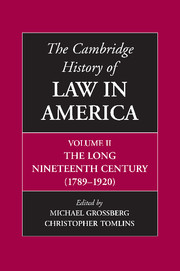Book contents
- Frontmatter
- 1 Law and the American State, from the Revolution to the Civil War: Institutional Growth and Structural Change
- 2 Legal Education and Legal Thought, 1790–1920
- 3 The Legal Profession: From the Revolution to the Civil War
- 4 The Courts, 1790–1920
- 5 Criminal Justice in the United States, 1790–1920: A Government of Laws or Men?
- 6 Citizenship And Immigration Law, 1800–1924: Resolutions Of Membership And Territory
- 7 Federal Policy, Western Movement, and Consequences for Indigenous People, 1790–1920
- 8 Marriage and Domestic Relations
- 9 Slavery, Anti-Slavery, and the Coming of the Civil War
- 10 The Civil War And Reconstruction
- 11 Law, Personhood, and Citizenship in the Long Nineteenth Century: the Borders of Belonging
- 12 Law in Popular Culture, 1790–1920: The People and the Law
- 13 Law and Religion, 1790–1920
- 14 Legal Innovation and Market Capitalism, 1790–1920
- 15 Innovations in Law and Technology, 1790–1920
- 16 The Laws of Industrial Organization, 1870–1920
- 17 The Military in American Legal History
- 18 The United States and International Affairs, 1789–1919
- 19 Politics, State-Building, and the Courts, 1870–1920
- Bibliographic Essays
- Notes on Contributors
- Index
10 - The Civil War And Reconstruction
Published online by Cambridge University Press: 28 November 2008
- Frontmatter
- 1 Law and the American State, from the Revolution to the Civil War: Institutional Growth and Structural Change
- 2 Legal Education and Legal Thought, 1790–1920
- 3 The Legal Profession: From the Revolution to the Civil War
- 4 The Courts, 1790–1920
- 5 Criminal Justice in the United States, 1790–1920: A Government of Laws or Men?
- 6 Citizenship And Immigration Law, 1800–1924: Resolutions Of Membership And Territory
- 7 Federal Policy, Western Movement, and Consequences for Indigenous People, 1790–1920
- 8 Marriage and Domestic Relations
- 9 Slavery, Anti-Slavery, and the Coming of the Civil War
- 10 The Civil War And Reconstruction
- 11 Law, Personhood, and Citizenship in the Long Nineteenth Century: the Borders of Belonging
- 12 Law in Popular Culture, 1790–1920: The People and the Law
- 13 Law and Religion, 1790–1920
- 14 Legal Innovation and Market Capitalism, 1790–1920
- 15 Innovations in Law and Technology, 1790–1920
- 16 The Laws of Industrial Organization, 1870–1920
- 17 The Military in American Legal History
- 18 The United States and International Affairs, 1789–1919
- 19 Politics, State-Building, and the Courts, 1870–1920
- Bibliographic Essays
- Notes on Contributors
- Index
Summary
The Civil War and Reconstruction utterly transformed American society. Historians argue over the nature and extent of the changes wrought during the period, but there is little disagreement over the importance of the period as such: if nothing else, the sheer volume of scholarship establishes that point. Textbooks and college-level survey courses usually break with the Civil War and Reconstruction, which provide either the ending for the first half or the beginning of the second half. Books debating the causes of the war and its implications line the library shelves and are fully represented in virtually every historical subfield: party politics, ideology, religion, the economy, slavery, race and ethnicity, the status of women, class, the West, the South, religion, nationalism and state formation, as well as law and the Constitution. Other historical issues dating from the American Revolution to the present are linked to this period as well – historians look back to the nation’s founding for the war’s roots and then trace its effects into the present.
Rather than focusing on the war years or their immediate aftermath, legal historians have tended to concentrate on matters linked to it, before and after. Particular emphasis has been given to the perceived limits of the U.S. Constitution in diffusing the issues that led up to war and to the changes that occurred in federal law afterward, although a considerable body of work examines the legal implications of policy changes in the Union during the war as well. The first group of professional historians to consider these issues had been raised in the bitter aftermath of the war, and their work reflected that background.
- Type
- Chapter
- Information
- The Cambridge History of Law in America , pp. 313 - 344Publisher: Cambridge University PressPrint publication year: 2008

